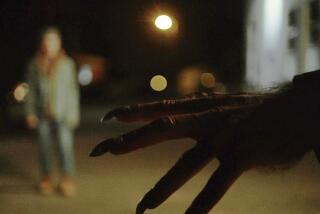Review: Tom Ford’s skillful meta-thriller ‘Nocturnal Animals’ revisits a broken marriage

Justin Chang reviews ‘Nocturnal Animals’. Directed by Tom Ford, starring Amy Adams, Jake Gyllenhaal, Michael Shannon, Aaron Taylor-Johnson, Isla Fisher, Armie Hammer, Laura Linney, Michael Sheen, and Jena Malone. Video by Jason H. Neubert.
A corrosively beautiful cocktail of a thriller, Tom Ford’s “Nocturnal Animals” tells three interwoven stories, all of them concerning roughly the same characters, but each one set in a different time and place. One story unfolds under the dim lights and dreary pretensions of the Los Angeles art scene, populated by nipped-and-tucked vampires who are meant to represent the city’s jaded cultural elite. Another begins during a blizzard in Manhattan, where two old friends enjoy a warm, life-changing reunion.
Ironically, the longest, darkest and most gripping of the stories is the one that, within the movie’s fictional reality, is itself presented as a work of fiction: a stark and terrifying West Texas crime thriller, dreamed up by a novelist in the grip of some pretty serious demons. Real or not, it scarcely mitigates the powerful tremors of guilt, self-loathing and recrimination left in the story’s wake — a sly reminder that literature, like cinema, creates its own rules.
As one of the biggest names in American fashion, Ford may trade in visions of arch, artificial glamour. But again and again in “Nocturnal Animals” — skillfully adapted from Austin Wright’s 1993 novel, “Tony and Susan” — the writer-director invests a tricky narrative juggling act with an intensity of human feeling that is the opposite of skin-deep. He tears through the veil of slick, self-admiring style that has both unlocked and at times obscured his very real merits as an artist.

Amy Adams, Jake Gyllenhaal, Michael Shannon, Armie Hammer and Aaron Taylor-Johnson star in Tom Ford’s “Nocturnal Animals.”
In “A Single Man” (2009), his intoxicating debut feature about a day in the life of a gay English professor in 1962 Los Angeles, Ford demonstrated an affinity for gorgeous surfaces, even more gorgeous actors and the bold, formalist flourishes of Douglas Sirk and Pedro Almodóvar. But he also showed an instinctive feel for performance, rhythm and visual storytelling, belying the shallowness that some attributed to him simply because he came to filmmaking by way of Gucci and Yves Saint Laurent.
Not that Ford is above skewering the chic, image-obsessed enclaves in which he has been known to move. Yet while there are choice satirical moments here — look out for Michael Sheen, Andrea Riseborough and Jena Malone, giving priceless one-scene performances as various L.A. socialites — the movie’s vision of this glossy, self-regarding world is much more tragic than it is funny.
At the center of it is Susan, an art-gallery owner played by Amy Adams with a mesmerizing blend of hauteur and vulnerability. She lives in a state of almost enviably picturesque unhappiness with her handsome, faithless husband, Hutton (Armie Hammer), whose feelings toward her have turned as cold and bare as the walls of their home, a staggering modernist fortress overlooking the Hollywood Hills.
The roots of Susan’s misery are suggested by the package she receives one day from Edward, the aspiring writer she divorced 19 years earlier. He has sent her a copy of his unpublished novel, “Nocturnal Animals,” which Susan begins reading and finds inescapably engrossing. So, too, does the audience. In Ford’s assured hands, the characters of Edward’s book leap off the page and onto the screen with a vividness that matches and ultimately transcends Susan’s own.
The glittering cityscape of L.A. recedes, and soon we’re deep in Texas noir territory. A fictional version of Edward (Jake Gyllenhaal), driving late at night with his wife (Isla Fisher) and daughter (Ellie Bamber), runs afoul of three local toughs — the nastiest of whom is played with revelatory redneck flair by Aaron Taylor-Johnson (“Kick-Ass,” “Nowhere Boy”). A shattering loss ensues, and over the next few months, Edward, aided by a gruff, Stetson-wearing detective (a darkly funny Michael Shannon), finds himself on an unsteady path toward revenge.

“Nocturnal Animals” full Q&A includes a chat between Glenn Whipp and actors Aaron Taylor-Johnson and Michael Shannon.
Back in the “real” world, of course, that revenge has a very different target. Even without all the abrupt cutaways to a horror-struck Susan suddenly slamming the manuscript shut, it would be clear that her ex-husband’s novel isn’t just one hell of a harrowing yarn. It is nothing less than a meta-autopsy on their broken marriage, an excoriating portrait of a man grappling with his failures as a husband and father and ultimately laying the blame squarely at Susan’s feet.
It’s here that the film introduces still another narrative thread, this one revealing how Susan and Edward (also played by Gyllenhaal) fell in love, and how their fundamental differences in ambition and temperament ultimately tore them apart. The film begins cutting between California, Texas and New York with increasingly frenzied vigor, almost subliminally suggesting the bonds of class and culture, geography and worldview, that have doomed these characters to their present state of bitter isolation.
If all this sounds terribly grim and heavy, Ford remains too much of a sensual ironist to overlook the material’s underlying camp potential. (Laura Linney makes a hoot of a cameo as Susan’s socialite mother, impeccably coiffed and wearing a three-strand pearl necklace.) And some of the director’s more overtly stylized touches — the operatic progressions of Abel Korzeniowski’s score (like Philip Glass making love to Bernard Herrmann), or a lurid crime scene that looks like a lovingly arranged museum exhibit — almost seem to be mocking the movie’s more serious ambitions.
There are moments here when Ford’s formal command fails him, particularly when he overplays the parallels between his real and fictional narratives. The color red gets a heavily symbolic workout, and while it would be churlish to complain about too many scenes of Adams and Gyllenhaal taking long, meditative showers, the continual juxtaposition of their faces and bodies, their characters literally soaking in their shared sense of tragedy, feels like the work of an altogether less confident filmmaker.
At a certain point, though, you begin to understand why Ford keeps hammering the connection between Susan and Edward: He’s trying to balance them out. Gyllenhaal’s performance, for all its rich emotional shadings, is a howl of pure, emasculated rage, one that builds and builds in intensity until it all but overwhelms the picture.
Is “Nocturnal Animals” an indictment of Edward’s impotence, or a defense of it? That question matters less than the movie’s treatment of Adams, who, as the movie’s ostensible protagonist, is no less subtly heartrending than she is in “Arrival,” her other big movie of the moment. But Susan is an essentially reactive figure, a woman being made to answer for her past crimes and suffer the consequences in the present and future. You feel only compassion for her by movie’s end — enough to wish that Ford, for all his dazzling and demonstrable skill, had extended her a bit more of his own.
------------
‘Nocturnal Animals’
MPAA rating: R, for violence, menace, graphic nudity and language
Running time: 1 hour, 57 minutes
Playing: ArcLight Cinemas, Pasadena; ArcLight Cinemas, Hollywood; the Landmark, Los Angeles
See the most-read stories in Entertainment this hour »
Movie Trailers
More to Read
Only good movies
Get the Indie Focus newsletter, Mark Olsen's weekly guide to the world of cinema.
You may occasionally receive promotional content from the Los Angeles Times.







